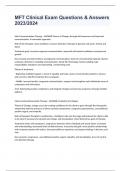MFT Clinical Exam Questions & Answers
2023/2024
Satir Communications Therapy - ANSWER-Theory of Change: through self awareness and improved
communication. A humanistic approach.
Role of the therapist: active facilitator, resource detective, therapist is genuine and warm, honest and
direct
Treatment goals: increase congruent communication, improved self-esteem/confidence and personal
growth.
Key concepts and interventions: incongruent communication, styles of communication (placate, blamer,
computer, distracter), modeling communication, family life chronology, family sculpting, take
responsibility, metaphors and storytelling , transforming rules
Phases of treatment:
- Beginning: establish rapport, a sense of equality and hope, assess communication patterns, stances,
and concerns, identify treatment focus and goals
- Middle: increase family's congruent communication, support and strengthen each individuals sense of
uniqueness and self-esteem
-End: help family practice, implement, and integrate changes and increase awareness of larger familial
patterns
Client-centered/Humanistic Therapy - ANSWER-Created by Carl Rogers
Theory of Change: change occurs by creating conditions for the client to grow through the therapeutic
relationship with the presence of three essential components: congruence/genuineness, unconditional
positive regard, and empathy.
Role of therapist: therapist is nondirective, a facilitator who sets the stage and believes the client is able
to do what is necessary for growth and change, self-actualization. Client determines goals of therapy.
Treatment Goals: self-acceptance, congruence between client's idealized and actual selves, increased
self-understanding, decreased levels of defensiveness, insecurity and guilt, more positive relationships
and increased comfort with others, increased ability to experience and express feelings in the here and
now
Key concepts: congruence, unconditional positive regard, empathy, self-actualization, locus of control,
non-directive therapy
, Gestalt Therapy - ANSWER-Created by Fritz Perls
Theory of Change: increased awareness of here-and-now experience in a dialogic relationship. Both
existential and humanistic.
Role of Therapist: authentic, present other, non-directive and non-judgmental, increase the client's
awareness in the present moment
Treatment Goals: clients become aware of what they are doing, how they are doing it, and how they can
change themselves, and at the same time, learn to accept and value themselves.
Key Concepts: phenomenological method, dialogic relationship, experiential, here-and-now focus.
Interventions: empty chair technique, experiments, body techniques, focuses on process and less on
content.
Existential Therapy - ANSWER-Theory of Change: Change occurs through finding philosophical meaning
in the face of anxiety by choosing to think and act authentically and responsibly. The core question
addressed in existential therapy is "How do I exist?" in the face of uncertainty, conflict, or death.
Role of Therapist: Provide an encounter with a "real" other, therapist is present, helps client focus on
personal responsibility for making decisions.
Tx Goals: Client discovers own life meaning, confronts anxiety inherent in living, experiences agency and
responsibility in the construction of their life
Key Concepts: All persons have the capacity for self-awareness, as free beings, everyone must accept the
responsibility that comes with freedom, each person has a unique identity that can only be known
through relationships with others, each person must continually recreate themselves, anxiety is part of
the human conditions, death gives significance to life.
Interventions: Focus on moment-to-moment process rather than content, holding up the problem
experience so it may be seen, remembered, and re-experienced by the client, empathetic availability,
telling, talking about and naming emotional pain, mastering emotional pain, honoring the pain.
Experiential/Symbolic Therapy - ANSWER-Created by Carl Whitaker
Theory of Change: Change happens through existential encounter- the authentic meeting of the
therapist and the client in the present moment and by expanding the client's range of experience.
Role of Therapist: Authentically being with client, playful, creative.
Key Concepts and Interventions: Battle for structure, battle for initiative, trial of labor, activating
constructive anxiety, play, humor and "craziness".
Phases of Treatment:




